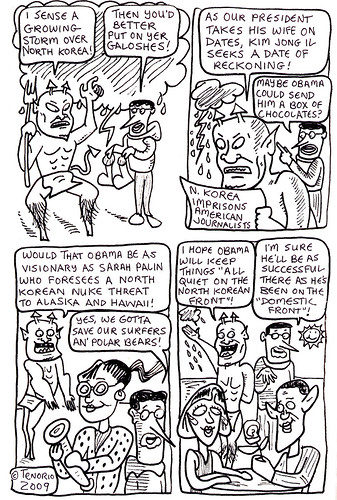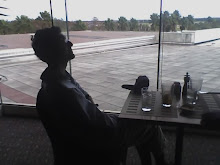A few weeks ago, Gov. Sarah Palin of Alaska warned of a North Korean nuke threat to Hawaii. Now President Barack Obama is saying the same thing. Does this make Palin a foreign-affairs visionary? Find out in the latest episode of "The Devil Made Me Blog It"!
Saturday, June 27, 2009
Wednesday, June 24, 2009
Pessimism on protestors in Iran
Thirty years after its founding in a revolution, the Islamic Republic of Iran seems on its shakiest footing yet. Young Iranians have grown disenchanted with the theocratic government of Supreme Leader Ali Khamenei and President Mahmoud Ahmadinejad after Ahmadinejad won a disputed presidential election. This disillusionment has revealed itself through public protests, and the government has responded with violent measures.
This might give many Americans reason to cheer. In the past three decades, Iran has repeatedly angered the United States, and the CIA helpfully summarizes the US' complaints:
This might give many Americans reason to cheer. In the past three decades, Iran has repeatedly angered the United States, and the CIA helpfully summarizes the US' complaints:
Iran has been designated a state sponsor of terrorism for its activities in Lebanon and elsewhere in the world and remains subject to US, UN, and EU economic sanctions and export controls because of its continued involvement in terrorism and its nuclear weapons ambitions.Dare Americans dream that the protestors represent a better alternative than the mullahs who currently rule? This blogger would say no. The combination of young people and street protests offers a tantalizing hope for democracy, but history and current events suggest otherwise.
- Student protests in Iran have a history of going against American interests. On Nov. 4, 1979, student demonstrators took over 60 Americans hostage at the U.S. embassy in Tehran. As PBS reported, "The students vowed not to release the Americans until the U.S. returned the Shah for trial, along with billions of dollars they claimed he had stolen from the Iranian people." The hostage crisis helped sink the government of President Jimmy Carter, and only in 1981, minutes after the inauguration of Carter's successor, Ronald Reagan, did the hostages see freedom.
- The demostrators' darling isn't necessarily democratic. Mir-Hossein Moussavi, the loser of this year's election, didn't materialize out of nowhere. He served as prime minister from 1981 to 1989. And in a pre-election interview with the Financial Times, he had some relatively warm words for his opponent. "Mr Ahmadi-Nejad is the president and for this reason I respect him," Moussavi said. "There are criticisms about his opinions and behaviour. This is natural in countries like ours in which there is freedom. I don’t see Mr Ahmadi-Nejad himself as a danger."
Friday, June 12, 2009
Date night with Kim Jong Il?
President Obama faces a tough task: Balancing date night with Michelle and tense relations with North Korea. The government of Kim Jong Il has detained two American journalists -- and Alaska Gov. Sarah Palin fears a North Korean nuke attack on two states -- hers, and Hawaii. Read more in the latest episode of "The Devil Made Me Blog It"!
Wednesday, June 10, 2009
Palin's Committee of Appropriations
Seems Alaska Governor Sarah Palin has appropriated someone else's work again ... and once more, she's drawn anger over it.
Huffington Post blogger Geoffrey Dunn accused Palin of lifting too much material in a recent speech from an article by former GOP House Speaker Newt Gingrich -- who, like Palin, may run for president in 2012. But the Associated Press calls it a non-story:
"Gingrich takes no issue with (Palin) for using his words," the AP reported. "In fact, he'd be happy if more Republicans espoused his ideas, a spokesman for the former House speaker said Monday."
Looks like Palin's internalized that time-honored journalistic chestnut: Consider your source.
Huffington Post blogger Geoffrey Dunn accused Palin of lifting too much material in a recent speech from an article by former GOP House Speaker Newt Gingrich -- who, like Palin, may run for president in 2012. But the Associated Press calls it a non-story:
Dunn posted the accusation Saturday on the Huffington Post, a liberal political Web site and blog, after comparing Gingrich's article and Palin's speech. Palin twice referenced Gringrich's article last Wednesday in Anchorage as she introduced conservative talk show host Michael Reagan, the son of former President Ronald Reagan.This isn't the first time Palin used someone else's words and got a negative response. After she debated Democratic vice-presidential nominee Joe Biden last fall, her post-party featured the accompaniment of country star Martina McBride's anthem of empowerment "Independence Day." This upset the songwriter, Gretchen Peters, who told "Democracy Now":
(This) is a song about domestic abuse ... she represented the opposite of what this song really is all about. And I just—I knew that I didn’t have any legal recourse, but I also felt like I could have—that there was some way for me to make some kind of a statement.And make a statement she did. Peters donated royalties from the song to Planned Parenthood in Palin's name. Luckily, this time around, Palin's source isn't upset.
"Gingrich takes no issue with (Palin) for using his words," the AP reported. "In fact, he'd be happy if more Republicans espoused his ideas, a spokesman for the former House speaker said Monday."
Looks like Palin's internalized that time-honored journalistic chestnut: Consider your source.
Wednesday, June 3, 2009
Unsettling times for Israel-Fatah peace prospects
Let's say you're the State of Israel. The Palestinian governments in the West Bank and Gaza Strip are divided between Fatah and Hamas. You have an opportunity to bridge relations between one of them -- Fatah. So what do you do? Antagonize Fatah, of course!
That's what's happening thanks to Prime Minister Benjamin "Bibi" Netanyahu, whose government is eager to build new settlement housing in the West Bank. The West Bank, of course, is where the Fatah government of President Mahmoud Abbas just happens to reside.
"'You can't freeze life' in the settlements, an official quoted Netanyahu as saying, defending his view that existing settlements must expand to accommodate growing families," Reuters reported on Wednesday.
Brilliant, Bibi, just brilliant. Not only does this put a dent in any friendly relations you were hoping to cultivate with Fatah, it also risks the goodwill between Israel and the Obama Administration.
Of course, there are reasons for Netanyahu encouraging the settlers. Israel, after all, is one of the world's most densely populated countries, and its people sure can't expand into the Negev Desert, as the government's motto there seems to have changed from "make the desert bloom" to "make the desert a toxic waste dump." Israeli expansion into the West Bank would potentially increase the population of the country while keeping the religious right happy. And as far as jeopardizing relations with the Obama Administration, the New York Times noted, our 44th president may be realizing his predecessors weren't able to do much about stopping settlements.
Israel should curb its desire to create and sustain illegal settlements, and foster goodwill between itself and Fatah. Unfortunately, it looks like Netanyahu will bulldoze not only more land in the West Bank, but also the prospect of peace between Israel and Fatah.
That's what's happening thanks to Prime Minister Benjamin "Bibi" Netanyahu, whose government is eager to build new settlement housing in the West Bank. The West Bank, of course, is where the Fatah government of President Mahmoud Abbas just happens to reside.
"'You can't freeze life' in the settlements, an official quoted Netanyahu as saying, defending his view that existing settlements must expand to accommodate growing families," Reuters reported on Wednesday.
Brilliant, Bibi, just brilliant. Not only does this put a dent in any friendly relations you were hoping to cultivate with Fatah, it also risks the goodwill between Israel and the Obama Administration.
Of course, there are reasons for Netanyahu encouraging the settlers. Israel, after all, is one of the world's most densely populated countries, and its people sure can't expand into the Negev Desert, as the government's motto there seems to have changed from "make the desert bloom" to "make the desert a toxic waste dump." Israeli expansion into the West Bank would potentially increase the population of the country while keeping the religious right happy. And as far as jeopardizing relations with the Obama Administration, the New York Times noted, our 44th president may be realizing his predecessors weren't able to do much about stopping settlements.
Many in the Muslim world are waiting to see what Mr. Obama will do if, as expected, Israel ignores his request on the settlements. When asked about this ... Mr. Obama indicated that he was not yet ready to stipulate an "or else,” despite the fact that several American presidents before him have demanded settlement freezes in Israel and been ignored.But what about keeping Israel's neighbors happy? The peace treaties of 1979 with Egypt and of 1994 with Jordan brought good results for Israel and neighboring nations (less hostilities, more American aid). While the hope created by the Oslo Accords of 1993 transformed into disillusionment and despair after the Al Aqsa Intifada of 2000, relations between Fatah and Israel seemed to improve recently, given that the governments share an enemy in Hamas.
Israel should curb its desire to create and sustain illegal settlements, and foster goodwill between itself and Fatah. Unfortunately, it looks like Netanyahu will bulldoze not only more land in the West Bank, but also the prospect of peace between Israel and Fatah.
Subscribe to:
Posts (Atom)





